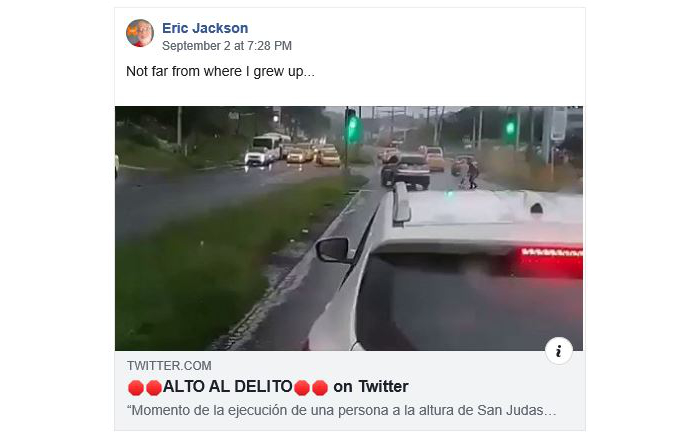A 14-second video of a mid-afternoon shooting at a traffic light on the Transistmica at Colon’s San Judas neighborhood on September 2 went viral on Twitter until it was taken down. This is a still from it. The two men in the road ahead fired into the car stopped to make the turn, wounding the driver and passenger, then ran away in different directions. Police say they quickly caught the two gunmen.
Crime in the streets and in the suites dominates Panama’s news
by Eric Jackson
Low places
In the sex and death tabloids, the big crime stories have been coming out of Colon. On September 2, a broad daylight shooting in the busiest of places. Looks like a gang hit, but authorities are not saying. Then on September 6, maleantes invaded the battered and displaced women’s shelter that the Sisters of Mercy run, robbing the women there and when the police showed up holding them hostage.
Earlier, Security Minister Rolando Mirones had announced that a Varela administration task force among many law enforcement components that had been making sweeps through Colon would be disbanded. That was Joint Task Force Aguila. But Mirones turned right around created Task Force Alfa, which has been making sweeps through Colon. Much of that change was driven by arguments about the shape and membership of the law enforcement command structure here, but the old police notion of sending out great numbers of officer to round up the maleantes when things get too outrageous still prevails.
Municipal authorities in Colon also took recourse to another traditional response to garden variety crime waves. They declared a curfew for minors between 8 p.m. and 6 a.m.
High places
In the wake of Ricky Martinelli’s spurious acquittal and his subsequent threats against everyone who has prosecuted or written about his crimes, the courts have mostly continued to set people free in cases of public corruption. Most recently we have been treated to the news that on some procedural ground Panama paid $40 million for a Tonosi Valley irrigation system that we didn’t get, the money was laundered through the defunct Financial Pacific brokerage firm, a Securities Superintendency investigator was disappeared and there will be absolutely zero accountability for any of that. Except, of course, if prosecutors can find a way to appeal and the high court changes its stripes or its personnel.
That, however, has been overshadowed by a series of investigative reports in La Prensa and some prosecutors’ announcements following upon that. Last year some Israeli private investigators recorded attorney Janio Lescure boasting about his ability to bribe people in the Panamanian legal system and a brief report issued this past January. That, however, was far from the end of the story. La Prensa, and apparently prosecutors, have been digging all this time. NOW high court magistrate Oydén Ortega Durán has been named in La Prensa for taking bribes — he denies it — and his son Oydén Ortega Collado is under criminal investigation for related influence trafficking.
The press reports are that four Supreme Court magistrates have been named. The Public Ministry has assigned the case to the organized crime prosecutor’s office, but when it comes to magistrates themselves only the National Assembly has criminal jurisdiction.
President Cortizo has a bunch of vacancies to fill on the court, and scandals may give him more. The problem might be that legislators who don’t want the high court acting on allegations against members of the National Assembly might seek to prevent that by declining to act against members of the Supreme Court, which has criminal jurisdiction over legislators.
These links are interactive — click on the boxes













